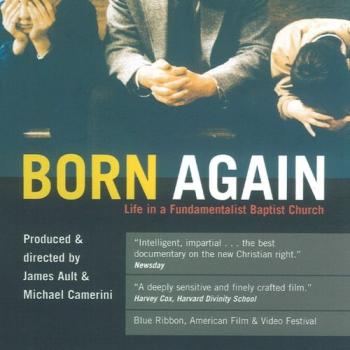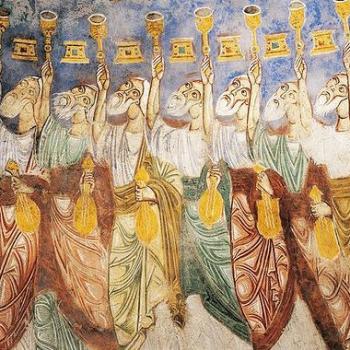Is there hierarchy in the Trinity? Part 1
One of the many controversies among evangelical theologians and biblical scholars surrounds the question of the immanent Trinity, specifically whether there is within it an eternal hierarchy of authority with the Son being subordinate to the Father. In this particular controversy “subordinate” means with regard to authority. So the specific issue dividing evangelical theologians and biblical scholars is whether the Son (and I assume the Holy Spirit) exists eternally under the Father’s authority. (I will spell out the who’s and what’s of this controversy in future installments.)
So far as I know, nobody in this debate or elsewhere denies that the Son is subordinate to the Father in the economic Trinity. That is, nobody I know denies that in relation to salvation history the Son obeys the Father especially during his years as a Jewish man living in Palestine. The Gospel of John makes this clear as Jesus repeatedly mentions that he came to do the Father’s will and prays that the Father will restore him to the glory they shared before the world began (John 17).
It’s important then, when attempting to understand this debate among evangelicals, to understand the difference (or at least distinction) between the immanent and economic Trinities. They are not two Trinities but two aspects of the one Trinity of Father, Son and Holy Spirit. There have been two periods in the history of Christian theology when this distinction has become the focus of much attention. One was the era of the Arian and Semi-Arian controversies of the 4th century and the other was and is the 20th century which, after Karl Barth’s resurrection of the doctrine of the Trinity, saw a renaissance of Trinitarian thought among Christians. That renaissance is continuing in the 21st century although I think it is now running into the ground with too much speculation about minutia.
The Cappadocian Fathers Basil, Gregory and Gregory were largely responsible for carving out the distinction between the immanent and economic Trinities. They felt it was important to make and hold to such a distinction for the sake of God’s transcendence; they did not want the Trinity tied exclusively to history as happened in the several modalist movements that described Father, Son and Holy Spirit as modes or manifestations or even masks of God true only in God’s relationship with the world in salvation history. That is, to put it bluntly, the various modalist groups (especially but not only Sabelius and his followers) reduced Father, Son and Holy Spirit to mere masks God wears; they were not regarded as real, permanent, eternal distinctions within God.
Against the modalists, then, the Cappadocian Fathers underscored the very real, ontological distinctions (I avoid the English word “differences” to avoid implying that they fell into tritheism which they strenuously denied) within the Trinity. Father, Son and Holy Spirit are distinct hypostastes sharing equally one ousia (essence, substance, being). (Unfortunately, there is no good English translation of hypostasis; we usually translate it “person,” but that wrongly implies separateness of selfhood.) For the Cappadocian Fathers (and this became orthodox doctrine from then on as it became the way in which the Niceno-Constantinopolitan Creed was interpreted in both the East and the West) there is an immanent, ontological, eternal Trinity. God did not become Trinitarian only in relation to creation and salvation history. And the three hypostases are not mere masks or manifestations or modes of one person; they are real centers of consciousness even if they are not in any way different. So, essentially, the immanent Trinity is eternal distinction without difference of three persons (to use flawed English): God in himself (or themselves).
Between the 4th century and the 20th century much focus of Trinitarian thought came to bear on the immanent Trinity sometimes to the detriment of the economic Trinity (the three distinct persons acting for us within history). At least that was what Catholic theologian Karl Rahner feared as he propounded his “Rahner’s Rule:” “The economic Trinity is the immanent Trinity and the immanent Trinity is the economic Trinity.” This “rule” became the focus of a great deal of attention and discussion as it was interpreted in different ways by, for example, Jurgen Moltmann (in many of his books but especially The Trinity and the Kingdom of God) and Walter Kasper (in, for example, his magisterial work The God of Jesus Christ). Rahner’s Rule became virtually an item of orthodoxy as a regulative principle to forbid dividing the immanent Trinity from the economic Trinity as if we can actually know anything about the former apart from the latter.
(For further brief survey and summary of the history of Christian thought about the Trinity see my book The Trinity written with Christopher Hall and published by Eerdmans.)
There is no doubt in my mind that the Great Church as a whole (both East and West including the magisterial Protestant Reformers) believed in a hierarchy within the immanent Trinity. “Where the reality exists there must also be the corresponding possibility” (Barth). If in the economic Trinity we see (e.g., in John 14-17) a subordination of the Son to the Father there must also be subordination of the Son to the Father in the immanent Trinity. The monarchy of the Father is clear in the Cappadocian Fathers and has always been taught by the Eastern churches. Moltmann is one contemporary theologian who has tried to soften this hierarchical notion of the Trinity by speculating about different patterns of relationships (including of authority) within the Godhead tied to the stages of the Kingdom of God in history. He emphasizes ways in which the Father is dependent on the Son and the Spirit which is true enough but does nothing to undo what the church fathers meant by hierarchy within the immanent Trinity.
So what did they mean? What did the Cappadocian Fathers and what does the Eastern Church (or churches) mean by the “monarchy of the Father?” And how did they/do they avoid Arianism or Semi-Arianism (heresies that deny the equality of the Son with the Father in terms of divinity)? That’s a very long and complicated story, of course, so I can only answer in a nutshell. By the “monarchy of the Father” the Cappadocian Fathers meant only that the Father is the source or “fount” of divinity within the Godhead; the Son and the Spirit derive their deity from the Father eternally (so there is no question of inequality of being). Their favorite analogy was the sun and its light and heat. There is no imagining the sun without its light and heat and yet it is the source of them. So the Son, who became Jesus Christ in the incarnation, is begotten of the Father from eternity (not in time) (the technical term is generated but it means the same) and the Holy Spirit proceeds from the Father (and the Western church added filioque—“and the Son). (I happen to think the filioque addition to the Niceno-Constantinopolitan Creed was a mistake and it should be undone or revised to say “through the Son” although that has its problems as well.) In brief, then (without going into all the ins and outs of the filioque controversy or even the debates about the generation and procession of the Son and the Spirit), the “monarchy of the Father” in traditional, orthodox doctrine means only that the Father is the eternal, ontological source, fount, origin of the Son and the Spirit. It has nothing to do with authority over which, if imported into the immanent Trinity, would imply a kind of subordinationism.
So why is it important to have a monarchy of the Father within the immanent Trinity? The Cappadocian Fathers argued it is necessary to preserve and protect the distinctiveness of the three hypostases. Some also argue it is necessary to preserve and protect the connection between the economic Trinity (in which there is clearly subordination) and the immanent Trinity.
Now, there are so many issues here that I can’t even begin to discuss them all! But it is absolutely crucial to understand this distinction between the immanent Trinity and the economic Trinity before diving into the current evangelical controversy over the Trinity. My suspicion is that many evangelicals who write about the subject are not properly or carefully enough making this distinction. My theses going into this discussion are that 1) There is subordination of the Son and Spirit within the economic Trinity including in terms of authority over, and 2) The subordination of the Son and Spirit to the Father within the immanent Trinity has only to do with source, fount, origin of the divinity of the Son and the Spirit which does not automatically include a hierarchy of authority (i.e., obedience to). And I will argue that we cannot claim to know very much about the immanent Trinity, so even that (thesis 2) is arguable so long as we do affirm the immanent Trinity. In sum and in brief, I will argue that it is possible (if not necessary) to believe in the “monarchy of the Father” even within the immanent Trinity without making the Son and Spirit subordinate to the Father in terms of authority (i.e., obedience).
















